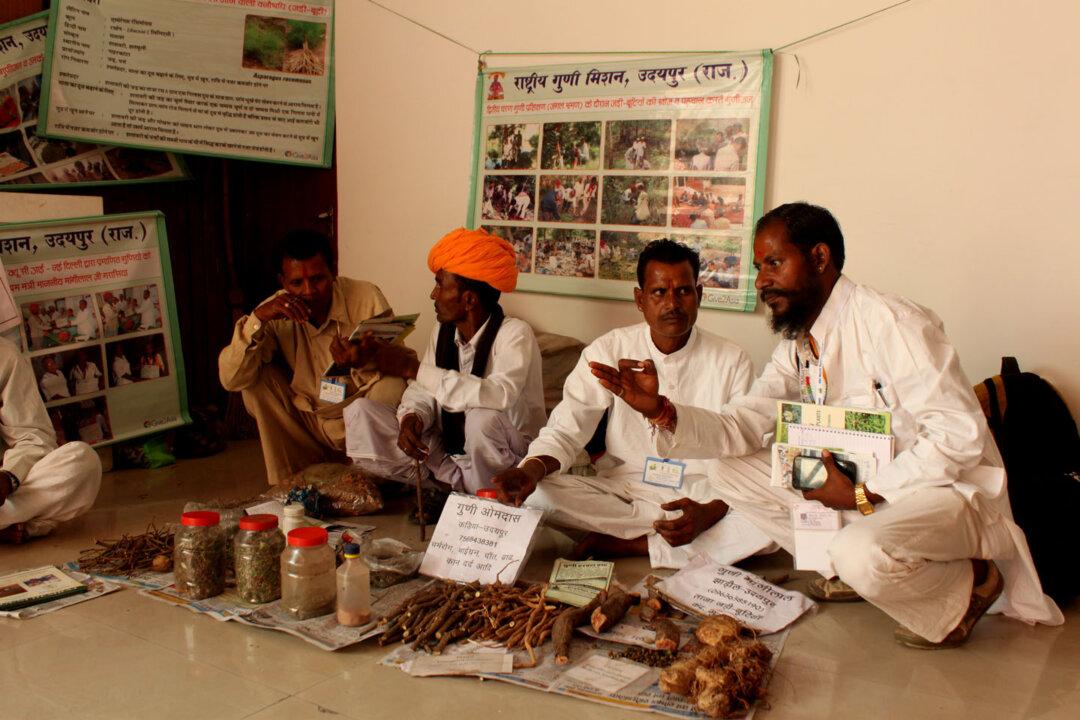NEW DELHI—India has more than one million traditional medicine practitioners, and together they are the largest private healthcare providers in the country.
While many Indians still rely on them for primary care, they are not recognized as doctors by the government because their systems are not standardized and many of them have never received formal education.
During a National Ayurveda Congress in New Delhi on Nov. 7, these traditional medicine practitioners formed a National Coordination Committee to lobby the government to recognize them as what they always considered themselves to be—doctors.
“I feel that the practices evolved by my ancestors are becoming suppressed,” said Pratapi Bai, a traditional doctor from Udaipur, a city in the western state of Rajasthan. “We want to bring these practices to the forefront.”
They say pharmaceutical companies come to villages looking for traditional doctors to ask them about their medicine. These doctors share their knowledge freely, which the companies then use to make drugs that are then patented.
Traditional medicine practitioners say that being recognized by the government would help them fight this IP theft.
“We don’t want degrees or money. We just want validation, respect for our traditional doctors,” said Bai.
They say this will also help separate the true healers from the phony ones, which could help boost the reputation of alternative medicine and alternative medicine practitioners in India.
Standardized Knowledge
The traditional practices of Ayurveda, Unani, Siddha and Homeopathy have a codified knowledge system, and doctors in these systems can be certified through schools.
But the government faces a steep challenge in certifying practitioners of other systems that are not as well known or have only been passed down by word of mouth.
It will have to create standards and measurements for these systems so it can develop criteria to certify these practitioners, many of whom live in remote areas, have little access to technology, and speak a diversity of languages.
In 2003, the Indian government rejected a proposal that would allow practitioners of other alternative medicine systems, such as electropathy, magnetotherapy, reiki, reflexology, urine therapy, aromatherapy, color therapy, and pranic healing to be recognized as doctors.
It compromised with acupuncture and hypnotherapy, saying, “Those considered as [a] mode of therapy can be conducted as certificate courses for registered medical practitioners.”
Aid to Society
Traditional doctors say it is worth the effort if the government can do this.
Ved Ram Prasad Rajvade, a traditional doctor from the central Indian state of Chattisgarh started studying herbs under his father at age eight. He says he has cured fractured bones, including spinal cord injuries, and even a few cases of cancer with herbal remedies.
“We have many times demanded from the Indian government that these traditional medicinal practices be promoted and these herbal medicines be studied and identified,” he said.
Traditional doctors point out that alternative medicine is often cheaper than conventional medicine, and has fewer side effects.
G. Hariramamurthi, associate professor at the Institute of Institute of Transdisciplinary Health Sciences and Technology in Bangalore said the National Coordination Committee would not only help protect traditional doctors from companies patenting their medicines, but would create awareness of their practices in India.
“It would strive to help traditional doctors even in remote, rural areas, and try to promote research on their medicines and practices,” he said.






